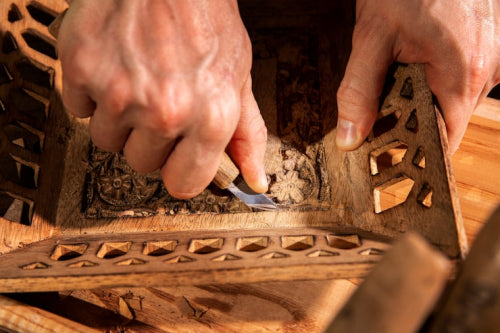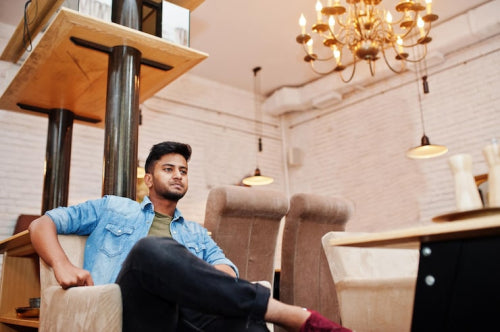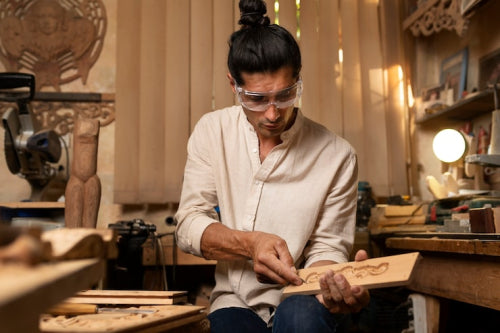In the vibrant chaos of Mumbai's Bandra West, where faded Art Deco facades mingle with towering glass condos, a professional duo lingers before a minimalist storefront. They've just navigated the afternoon throng of Chor Bazaar knockoffs and high-end imports, hands brushing against smooth sandalwood edges and intricate cane lattices. But instead of haggling or swiping a credit card, they whip out smartphones to decode barcodes and hunt for sharper online bargains. This ritual, unfolding hourly in India's teeming metros, signals a profound pivot in furniture acquisition: the fusion of hands-on exploration in real-world venues and the effortless pull of virtual transactions. With the Indian furniture sector poised to expand from USD 29.97 billion in 2025 to USD 43.24 billion by 2030 at a 7.6% compound annual growth rate, urban tastemakers in Bangalore and Chennai grapple with pivotal choices expansive retail showrooms brimming with choices or bespoke boutique studios delivering singular treasures. What route unlocks the ideal centerpiece for your sanctuary? Delve into Retail Showrooms vs. Boutique Studios: Choosing the Right Option for Furniture Shopping, an incisive examination of how these archetypes are revolutionizing domestic elegance across the subcontinent.
Mass-market furniture lacks heart, filling rooms with bland, short-lived pieces. Frequent breakdowns spark frustration, as replacements erode style and sentiment. At MMC Wood Creations, Udaipur artisans shape heirloom furniture with enduring craftsmanship and cozy elegance, creating pieces that echo your identity, ensuring your home radiates warmth and timeless connection. Shop Now!
The Expanding Landscape of India's Furniture Sector
India's furniture industry surges ahead of the nation's broader economic surge, propelled by relentless urbanization and rising household affluence. This trajectory manifests not in spreadsheets alone but in the tangible narratives of upwardly mobile clans in Pune's satellite townships equipping starter homes or Ahmedabad executives revamping offices with multifunctional consoles that serve as both utility and statement. Across key urban clusters Bangalore, Mumbai, Jaipur, Chennai, Kolkata, Hyderabad, Pune, and Ahmedabad consumers shun commoditized imports, gravitating toward artifacts that harmonize ancestral echoes with contemporary flux: envision resilient teak skeletons entwined with pliant cane, engineered to endure humid downpours and raucous reunions.
For innovators like MMC Wood Creations, this cresting wave offers unparalleled leverage. As a nascent player excelling in cost-effective, long-lasting cane, wooden, and alfresco furnishings, they prioritize enduring silhouettes that transcend ephemeral vogues, injecting permanence into a domain overrun by disposable decor. Nevertheless, their novice status poses a perennial quandary: piercing the veil of entrenched titans. The antidote resides in astute merchandising tactics that amplify these hallmarks, be it through voluminous showrooms flaunting diversity or snug ateliers fostering tailoring. In these focal metropolises, increasingly astute patrons propel the metamorphosis favoring encounters that resonate intimately, even within labyrinthine assortments.
This domestic vigor mirrors a planetary pulse. The international furniture arena registered USD 691.87 billion in 2025, charting a course to USD 902.09 billion by 2030 with a 5.45% annual clip, per Mordor Intelligence analysis. Asia Pacific commands the vanguard, capturing roughly 38% of the pie, invigorated by India's property renaissance and a burgeoning bourgeoisie yearning for versatile fixtures suited to squeezed cityscapes. Yet, amid e-tail's ascent, corporeal realms persist with tenacity. Consider showrooming dynamics, wherein patrons frequent physical outlets to palpate and appraise wares, only to consummate deals digitally for superior value a Janus-faced phenomenon that morphs emporia into interactive galleries while compelling vendors to transcend mere commerce.
Webrooming flips the script, with preliminary cyber scouting culminating in on-site acquisitions, a pattern that fortifies showrooms against obsolescence. Small operators, bound by fiscal reins, must nimbly counter these behaviors, perhaps by minimizing on-site stocks to spotlight experiential merits. For MMC Wood Creations, this duality underscores a strategic imperative: curate spaces where tactile allure the subtle flex of cane under pressure or the warm heft of seasoned wood compels commitment, bridging the chasm between curiosity and conversion.
Evolving Dynamics in Furniture Retail Venues
Step into Hyderabad's swankest galleria, and the undercurrent of transformation is palpable. Boutique ateliers proliferate akin to boutique roasteries, assembling elite repertoires that evoke less a transaction than a collaborative reverie. Mumbai's Studio X, for one, merges structural ingenuity with artisanal prowess, yielding finite editions from indigenous rosewood and rattan that captivate exclusivity seekers. Such enclaves flourish on proximity: one craftsman could devote fortnights to a woven settee, embedding tales of pastoral braids reborn for metropolitan verandas.
Concurrently, tech filaments interlace every facet. Vendors overlay augmented reality overlays on exhibition halls, enabling previews of that mahogany sideboard in your Kolkata pied-à-terre sans relocation. Livestream advisories on Instagram have solidified as staples, particularly since the health crisis, spanning divides for outlying Ahmedabad dwellers. This amalgamated potency stems from deliberate adaptation to webrooming's inverse online reconnaissance fueling in-person verdicts, safeguarding showrooms from stagnation.
MMC Wood Creation's paradigm dovetails seamlessly here. Their alfresco array, robust yet elegant, captivates in fleeting videos depicting dappled lawns in Bangalore's leafy enclaves. For an upstart, harnessing social's pictorial magnetism wherein cane's tactile weave contrasts stark canvases magnifies visibility sans exorbitant outlays. The pivotal shift? Transient ateliers in trafficked zones, previewing tailored variants that salute perennial motifs while anchoring costs in realism. In Jaipur's labyrinthine bazaars, such setups could spotlight sustainable sourcing, drawing eco-aware millennials who value traceability in every knot and grain.
Broader currents amplify this. Post-2020, hybrid models have ballooned, with 60% of Indian buyers blending channels per recent surveys. Retailers who ignore this risk irrelevance; those who embrace it, like MMC, position for dominance by wedding digital previews with sensory validations.
Illustrative Cases: Showrooms and Studios in Action
Pitting Bangalore's Home Centre sprawl against a hushed Jaipur atelier illuminates the dichotomy. Home Centre's vast precincts in Indiranagar exemplify the showroom ethos: corridors overflowing with loungers in myriad shades, spanning economical synthetics to moderate hides, consolidated under singular eaves. It offers a narrative odyssey for the populace snatch a sectional unit spontaneously, or mull over banquet ensembles vowing swift setup. For clans nesting a fresh Hyderabad high-rise, this profusion proves providential, abbreviating quests amid frenzied routines.
Shift to Urban Ladder's Chennai bastions in Anna Nagar or T. Nagar, honing in on amalgamated contemporary-heritage fusions. Affordability intersects ambition: a lithe acacia credenza mirroring viceregal loggias yet nestling into austere lofts. These hubs hum with Sabbath surges, their haptic interfaces permitting fabric fusions via screens a salute to showrooming acumen.
Ateliers, however, usher a divergent cadence. Jaipur's Pepperfry atelier in Malviya Nagar hones custom lumber marvels, from etched headboards to legacy armoires. Patrons transcend perusal; they co-create, adjusting veneers to echo lineage emblems. In Kolkata, rattan aficionados converge at Goodricke in Park Street, where weavers showcase interlacing arts live, transmuting crude vines into divans summoning Sunderbans serenity. Hyderabad's Fabindia Workshop in Banjara Hills ascends lumber risers and slabs to aesthetic pinnacles, proffering bespoke patinas that alchemize mundane milieus into refuges.
These vignettes transcend anomalies; they blueprint futures. MMC Wood Creations might mirror Fabindia's participatory ethos in a Kolkata transient, foregrounding rattan mastery to lure tastemakers disseminating ageless contours virally. Such maneuvers not only educate but evangelize, converting spectators into stewards of the brand's narrative.
Navigating Hurdles and Constraints
Perfection eludes every archetype, with showrooms shouldering magnitude's tolls. That cornucopia? It exacts substantial warehousing, immobilizing funds as surplus lingers. Bespoke tailoring recedes in the deluge your envisioned rattan pouf approximates, yet falters, dictating concessions. Moreover, in thrift-minded India, showrooming gnaws profits as deal-divers decamp digitally after trials.
Ateliers harbor barbs too. Their specialized allure curtails throughput; a Bangalore nook might enthrall aesthetes yet elude pragmatic seekers. Elevated tariffs for manual finesse? They bar the upwardly aspiring tier, notably in prudent Pune. For embryonic entities, amplifying singularity sans eroding authenticity is precarious proliferate rashly, and the "novice marque" murmur swells to discord's roar.
MMC Wood Creations counters via steadfastness: wares pledging decades, mitigating "hasty remorse" afflicting dual paradigms. Persistent qualms endure how forges a fledgling credence amid colossi? Testimonials from early adopters, spotlighting resilience in monsoonal climes, fortify this bastion.
Prospects and Commercial Ramifications
Adversity begets avenues. Showrooms seize prominence, etching marques into collective consciousness via Chennai's corridors. For MMC, a Bandra vanguard might flaunt alfresco spectra, ensnaring leisure furnishers. The expansive snare harvests bulk trades, bankrolling forays into Kolkata's craft corridors.
Ateliers, in turn, cultivate allegiance via scarcity. A Mumbai alcove debuting tailored rattan hammocks? Prime for algorithmic ascent, amid soaring quests for "eco alfresco seating." Affluent Jaipurites, magnetized by perennial poise, morph into apostles, their endorsements eclipsing promotional yields. Stateside, the sector's tempered 3.74% ascent to USD 232.61 billion by 2030 spotlights enduring ware's magnetism insights for India's fortification against downturns, redirecting outlays to resilient investments amid fiscal squeezes.
MMC's edge crystallizes: yoke opulence's magnetism with quotidian fortitude. A synergistic murmur showrooms for unveiling, ateliers for profundity might vault them from contender to cornerstone, notably in Chennai's ascendant atelier milieu. Integrating AR for virtual fittings could further democratize luxury, appealing to tech-fluent millennials in Hyderabad.
Striking Equilibrium for Sustainable Success
Ultimately, showroom amplitude nor atelier affinity monopolizes victory; triumph amalgamates them. As India's decor awakening accelerates spurred by conurbation and a worldwide arena coveting Asia's 38% dominion enterprises must pivot nimbly. MMC Wood Creations, rooted in rattan reverie, teeters on the brink: inaugurate approachable showrooms in Pune and Ahmedabad to ignite fervor, then superimpose atelier accents in Bangalore and Mumbai for arcane enchantment. Beyond vending fixtures, it's forging heritages in timber and twine.
Envision that Bandra pair anew, ensconced in a luminous alcove with an MMC rattan recliner caressed onsite, refined remotely, arrived with provenance. In an arena where emergent timbre slices clamor, tomorrow eschews singularity. It embraces synthesis that evokes hearth.
Frequently Asked Questions
What's the difference between furniture showrooms and boutique studios in India?
Furniture showrooms offer extensive collections under one roof with immediate availability and competitive pricing, making them ideal for quick purchases and bulk selections. Boutique studios focus on customized, artisanal pieces with personalized service and unique designs, catering to customers seeking exclusive, handcrafted furniture. Showrooms prioritize volume and convenience, while studios emphasize craftsmanship and individual customization.
Which is better for furniture shopping - large showrooms or small boutique studios?
The choice depends on your specific needs and budget. Large showrooms like Home Centre and Urban Ladder are perfect for families furnishing new homes quickly with affordable, ready-to-buy options. Boutique studios work best for customers wanting bespoke pieces, willing to invest more time and money for unique, handcrafted furniture that reflects personal style. Many savvy shoppers now combine both approaches, using showrooms for inspiration and studios for custom pieces.
How is India's furniture market changing with showrooming and webrooming trends?
India's furniture market is experiencing a hybrid shopping revolution, with 60% of buyers now blending online and offline channels. Showrooming allows customers to physically examine furniture in stores before purchasing online for better prices, while webrooming involves researching online first, then buying in-store. This trend is transforming furniture retail, with stores becoming interactive galleries and brands integrating AR technology and social media to bridge the gap between digital discovery and physical purchase.
Disclaimer: The above helpful resources content contains personal opinions and experiences. The information provided is for general knowledge and does not constitute professional advice.
You may also be interested in: Tables
Mass-market furniture lacks heart, filling rooms with bland, short-lived pieces. Frequent breakdowns spark frustration, as replacements erode style and sentiment. At MMC Wood Creations, Udaipur artisans shape heirloom furniture with enduring craftsmanship and cozy elegance, creating pieces that echo your identity, ensuring your home radiates warmth and timeless connection. Shop Now!
Powered by flareAI.co




